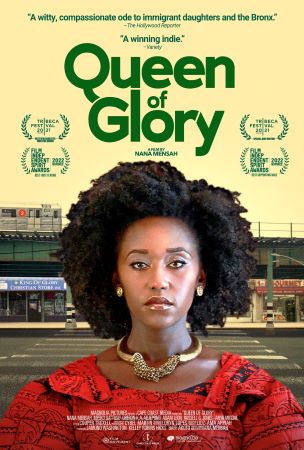
Queen of Glory 2021
Distributed by Film Movement
Produced by Kelley Robins Hicks, Jamund Washington, Anya Migdal, and Baff Akoto
Directed by Nanah Mensah
Streaming, 78 mins
General Adult
African American Culture; Dying; Immigration
Date Entered: 12/16/2022
Reviewed by Dorothy Ogdon, Head of Emerging Technology and System Development, University of Alabama at BirminghamQueen of Glory is the fictional narrative of Sarah Obeng (Nana Mensah), a doctoral student at Columbia University, and her relationship with her Ghanaian community, her father, and her friends and neighbors in New York City. Early in the movie, Sarah’s mother dies, leaving Sarah her house and Christian store, King of Glory. The store’s one employee, Pitt, an intimidating and erudite baker, depends on King of Glory for employment.
The movie is built around the emotional labor Sarah carries out as a woman (daughter, lover, employer, student, neighbor) and the ways this influences her decision-making. Before her mother’s death, Sarah is planning to follow a boyfriend to Ohio, leaving friends, family, and her academic career. Once she inherits her mother’s house and bookstore the motivations for her decision-making shift to focus on the needs of Pitt, and later her father. Over the course of the movie, she arranges two events for her mother (one American style gathering, one Ghanaian), and moves from being ready to leave New York to redeveloping King of Glory to give greater opportunities to Pitt.
Sarah’s Ghanaian identity is shown to the viewer indirectly. The narrative of the movie is interspersed with old film showing life events that may have taken place in Ghana (though this is never confirmed) and contrasting those visually with Sarah’s experiences in New York with both family and the cityscape itself. Interestingly, other than her assertions “I am a scientist” when characters in the film refer to her as a student, the viewer never hears Sarah’s thoughts or feelings about the roles she plays or the spaces she inhabits. Nana Mensah’s performance in most of the movie is closed, and contrasts strongly with moments of emotion she shows the viewer during her mother’s Ghanaian funeral and following a breakup.
While the conclusion of the movie suggests that Sarah may not be done with New York just yet, the movie ends without providing anything substantive about how Sarah envisions the next stage of her life, still enrolled at Columbia and now business owner without a mother or romantic partner.
Awards:Winner, Best New Narrative Director, Tribeca Film Festival. Winner, Audience Award, Indie Memphis Film Festival; Winner Best Narrative Feature, Indie Memphis Film Festival; Winner, NY Women in Film & TV Award, Hamptons Int'l. Film Festival; Winner, Best Feature Film, San Diego Int'l. Film Festival; Winner, Best First Feature Narrative, Pan African Film Festival
Published and licensed under the Creative Commons Attribution 4.0 license. Anyone can use these reviews, so long as they comply with the terms of the license.